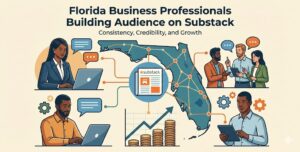
Florida's Economic Landscape: Rent Crisis, Tech Sector Growth, and Diverse Challenges
On a balmy autumn afternoon in Florida, the echoes of pressing economic issues reverberate across the state, painting a complex and multifaceted picture of its evolving landscape. The Florida Trend’s latest afternoon update offers a compelling blend of economic data, local business developments, and pressing socio-economic challenges, all of which shape the narrative of a state at the crossroads of change and opportunity.
Skyrocketing Rents Fueling Economic Anxiety
Amid vibrant Floridian cities characterized by their picturesque coastlines and bustling cultural scenes, a less idyllic reality is unfolding—skyrocketing rents. This phenomenon has increasingly become a focal point of economic anxiety for residents across the state. Recent statistics indicate that rental costs in major urban areas such as Miami, Orlando, and Tampa have surged by nearly 30% over the past year. This rapid escalation is not just pricing out low-income families but also biting into the disposable income of middle-class residents.
Juan Hernandez, a Miami Beach resident, shared his frustration: “I’ve lived here for over twenty years, but the rent hikes over the past two years have made it almost impossible to stay. I’m seriously considering moving to a more affordable state.” Hernandez’s predicament is echoed by thousands who are struggling to keep pace with the rising costs of living.
Technological Innovation: Bright Spot Amidst the Crisis
Despite the rental crisis, Florida’s economy is buoyed by a burgeoning tech sector that continues to attract significant investment. With tech hubs blossoming in cities like Tampa and Orlando, the state is positioning itself as a major player on the national tech scene. The infusion of venture capital into Floridian startups has been noteworthy, with tech companies receiving over $2 billion in investments in the past year alone.
At the heart of this technological renaissance lies a culture of innovation and entrepreneurship. Tampa-based tech entrepreneur, Lina Thompson, elucidates: “The support for tech startups here in Florida is tremendous. From state-sponsored grants to incubator programs, the ecosystem is creating fertile ground for new ideas to flourish.”
Furthermore, Florida's educational institutions, including the University of Central Florida and Florida International University, are fostering partnerships with tech companies to support research and development in emerging technologies. This symbiotic relationship is expected to generate more high-paying jobs in the tech sector, providing a counterbalance to the economic strain caused by the housing market.
Healthcare Sector Challenges and Resilience
Parallel to the growth in the tech industry, Florida’s healthcare sector faces formidable challenges but remains resilient. With an aging population, healthcare facilities are under increasing pressure to meet the growing demand for services. The strain is most apparent in the state’s nursing homes and assisted living facilities, which have reported a shortage of skilled healthcare professionals.
Dr. Marie Caldwell, a healthcare expert based in Jacksonville, notes, “We are experiencing a shortage in skilled healthcare workers, partly driven by burnout and competition from other states offering more competitive salaries. This has forced some facilities to operate at reduced capacity.” Nevertheless, the healthcare sector is adapting through innovative approaches, such as telehealth services and advanced medical training programs.
Environmental Concerns: Urgency and Action
Florida’s unique geographic position also places it at the forefront of environmental concerns. Coastal erosion, rising sea levels, and frequent hurricanes underscore the urgent need for robust environmental policies. The state government has been taking strides towards mitigating these threats through various initiatives, such as the Florida Resilient Coastlines Program, which helps communities plan and prepare for climate impacts.
In recent developments, Governor Ron DeSantis announced a $1 billion investment in Everglades restoration projects, aiming to enhance water quality and protect wildlife habitats. These efforts are critical as they not only preserve Florida’s natural beauty but also support its tourism-driven economy.
Agricultural Sector: Facing Headwinds Yet Adapting
Florida’s agricultural sector, renowned for its citrus fruits and diverse crop production, is another critical component of the state’s economy facing its own set of challenges. Agricultural yields have been impacted by climate change, with fluctuating weather patterns causing erratic harvests. In addition, the citrus industry is grappling with the long-term effects of “citrus greening,” a disease that devastates fruit-bearing trees.
Despite these adversities, Florida’s farmers and agricultural businesses are adapting through innovations in agricultural technology, or ‘AgTech.’ Hydroponics, precision farming, and genetically modified crops are among the strategies being employed to sustain and enhance productivity. The state’s agricultural extension programs are also playing a pivotal role in educating farmers on sustainable practices.
Real Estate Market Dynamics: Boom and Speculation
Beyond the rental crisis, Florida’s broader real estate market is a topic of incessant speculation. The state has been a hotspot for real estate investment, spurred by its favorable tax policies and appealing climate. However, this boom has led to worries about a potential bubble, especially in luxury housing markets.
According to the Florida Association of Realtors, the median home price in Florida increased by 20% year-over-year, driven largely by out-of-state buyers and real estate investors. This surge in prices is beneficial for property owners and investors but raises questions about accessibility for first-time homebuyers.
Jennifer Roberts, a real estate agent in Palm Beach, remarks, “The market is incredibly competitive. Properties get multiple offers, often above asking price, within days of being listed. It’s great for sellers but can be discouraging for buyers, especially locals trying to invest in their first home.”
Community Responses and Advocacy
Amid these dynamics, community organizations and advocacy groups are playing a crucial role in addressing the socio-economic challenges faced by Floridians. Groups like Florida Housing Coalition and local community action agencies are working tirelessly to provide relief and support to residents affected by the rental crisis. These entities are not only offering immediate assistance but also advocating for long-term policy changes to make housing more affordable.
Moreover, tech companies and universities are collaborating on initiatives to promote STEM education among underprivileged communities, seeking to bridge the digital divide. These efforts aim to ensure that as the tech sector grows, it does not leave behind those without access to the necessary skills and education.
In the healthcare sector, some innovative pilot programs are emerging: mobile clinics and telehealth services provide crucial access to healthcare in underserved areas, reflecting a trend towards more decentralized and accessible healthcare solutions.
Financial Sector: Robust but Cautious
Florida’s financial sector remains robust, with banks and financial institutions reporting healthy profits. However, there is a cautious undertone as economic inequalities become more pronounced. The disparity between high net-worth individuals and low-income families is growing, leading to calls for more inclusive financial policies.
Floridian banks are increasingly investing in community development programs, aiming to support local businesses and startups. These initiatives reflect a broader trend towards corporate social responsibility within the financial sector, seeking to foster economic resilience and inclusivity.
From skyrocketing rents to a thriving tech sector, from the challenges in healthcare to the pressing environmental and agricultural concerns, Florida’s economic landscape is one defined by contrasts and complexities. This intricate tapestry of issues demands the attention and action of policymakers, community leaders, and residents alike. As Floridians navigate these turbulent waters, the resilience and adaptability of its people remain a beacon of hope for a brighter, more equitable future.



